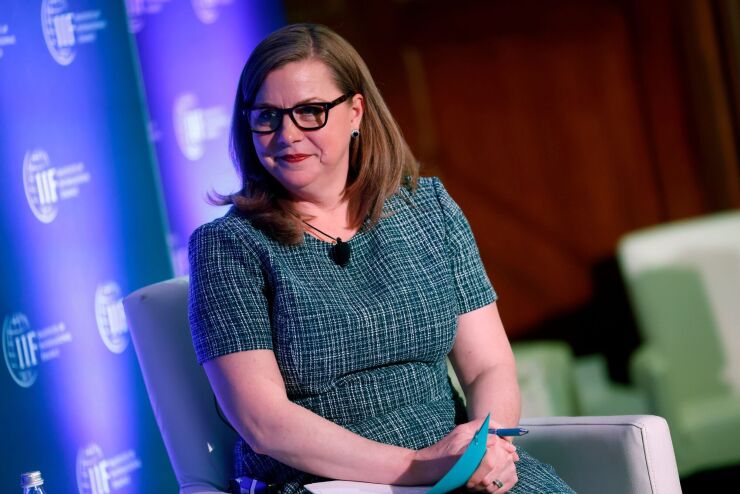
Michelle "Miki" Bowman, the Federal Reserve's new top banking regulator, is leading a significant shift in how the central bank approaches oversight, drawing heavily from her background in both the private and public sectors.
Since her confirmation as vice chair for supervision in June 2025, Bowman has signaled a move away from bureaucratic red tape and encouraged the Fed to focus more on the bigger picture.
Bowman has often emphasized the need for pragmatism in policymaking, regulatory tailoring and safeguarding against unintended consequences.
"We should be cautious about the temptation to overemphasize or become distracted by relatively less important procedural and documentation shortcomings," Bowman said during her
Bowman has argued that
She has also warned that if regulators are not open-minded, banks risk being sidelined in the evolving financial system.
"Banks should be encouraged to explore new technology, to engage in discussions with their regulators about how they can be deployed, and what reasonable supervisory expectations should apply," Bowman added. "In this context, a healthy dialogue and a commitment to learning ensures the bank and examiner relationship can be collaborative rather than antagonistic in tone."
Bowman has even floated the idea of
"I certainly wouldn't trust someone to teach me to ski if they'd never put on skis, regardless of how many books and articles they have read," she said during her speech. "We should consider whether limits on staff investment activities may be a barrier to recruiting and retaining examiners with the necessary expertise and for existing staff to better understand the technology."
Bank ratings, examination practices and capital requirements are
Throughout her speeches and public comments, Bowman has emphasized that her worldview as a regulator is shaped by a broad range of career experiences. She frequently cites her small-town Kansas roots and the influence of working in both business and government. She also highlights the importance of women in areas of leadership.
Her résumé includes work in the executive and legislative branches of government. After the Sept. 11 attacks, she helped establish the Department of Homeland Security and later ran a consultancy while based in England from 2004 to 2009.
In 2010, Bowman returned to Kansas and became vice president of Farmers and Drovers Bank, an institution founded by her family in 1882. Although she came to banking later in her career, she said it felt like a natural fit.
"Community banking is in my blood," she said. "I didn't have the opportunity to become a banker until well into my career and when I returned to Kansas in 2010 with my very young family, I really understood the importance of community banks within their communities, and they really are the cornerstone of the activity, the economy, and everything that happens within a community."
During that time she also joined the Eisenhower Series for Excellence in Public Service, an organization that supports
In 2017, she stepped into a regulatory position, serving as Kansas state bank commissioner. She held that post for nearly two years before being nominated by President Donald Trump to the Federal Reserve Board in 2018.
Bowman remained on the Fed board for almost seven years before being confirmed as the Fed's chief regulator. She has said her time in banking helped reinforce her belief that public policy should be shaped with "a narrow focus" on real-world outcomes, particularly in monetary policy and regulation.
That principle applies to how she wants the Fed to approach supervision: not as a means of preventing all bank failures, but rather in a way that ensures the system can withstand them. She has also criticized the Fed's past approach to emerging technologies, saying its guidance has often discouraged banks from innovating. Agency communication, she argues, should provide clarity not act as a deterrent.
"Our goal should not be to prevent banks from failing or even eliminate the risk that they will," she previously said. "Our goal should be to make banks safe to fail, meaning that they can be allowed to fail without threatening to destabilize the rest of the banking system."
Like her two predecessors, Michael Barr, who remains a Fed governor, and Randall Quarles, Bowman has said she will seek to reform the central bank's capital requirements and implement the international standards known as the Basel III endgame.
In speeches, Bowman has argued that the current regulatory framework took shape through a series of uncoordinated and backward-facing decisions that addressed
Bowman is no stranger to dissenting from her colleagues on the Federal Open Market Committee and has highlighted that she does so in stride.
"I have approached my responsibilities in an independent way, relying on facts, analysis, my own experience and judgment, and the pursuit of the congressionally mandated goals that guide the work of the Board," she said. "In some cases, this approach has led me to depart from the views of my colleagues."The Kansas native's rise to being one of the most notable regulators in the nation has not detracted her from cheering other women on to fill leadership positions. She has previously said that it's "wonderful" to see women filling senior positions and that a societal "shift" is starting to take hold.Bowman has also advocated for women to pursue careers in technical fields, arguing that a female perspective is impactful in areas that are mainly dominated by men.
"Women approach a thought process differently than men do and I think that by including that thought process and that decision making or analytical style into larger conversations, we benefit from having both of those perspectives, or all of those perspectives represented in our decision making processes," she said. "So we need more women in economics."





